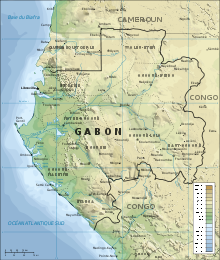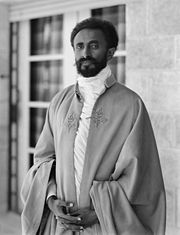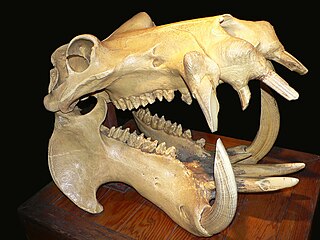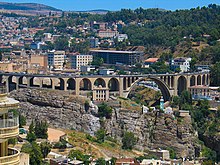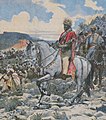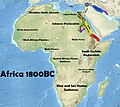Portal:Africa



Africa is the world's second largest and second-most populous continent after Asia. At about 30.3 million km2 (11.7 million square miles) including adjacent islands, it covers 20% of Earth's land area and 6% of its total surface area. With 1.4 billion people0 as of 2021, it accounts for about 18% of the world's human population. Africa's population is the youngest amongst all the continents; the median age in 2012 was 19.7, when the worldwide median age was 30.4. Despite a wide range of natural resources, Africa is the least wealthy continent per capita and second-least wealthy by total wealth, ahead of Oceania. Scholars have attributed this to different factors including geography, climate, lack of democracy, tribalism, corruption, colonialism, the Cold War, and neocolonialism. Despite this low concentration of wealth, recent economic expansion and the large and young population make Africa an important economic market in the broader global context.
Africa straddles the equator and the prime meridian. It is the only continent to stretch from the northern temperate to the southern temperate zones. The majority of the continent and its countries are in the Northern Hemisphere, with a substantial portion and a number of countries in the Southern Hemisphere. Most of the continent lies in the tropics, except for a large part of Western Sahara, Algeria, Libya and Egypt, the northern tip of Mauritania, and the entire territories of Morocco, Ceuta, Melilla, and Tunisia which in turn are located above the tropic of Cancer, in the northern temperate zone. In the other extreme of the continent, southern Namibia, southern Botswana, great parts of South Africa, the entire territories of Lesotho and Eswatini and the southern tips of Mozambique and Madagascar are located below the tropic of Capricorn, in the southern temperate zone.
Africa is highly biodiverse; it is the continent with the largest number of megafauna species, as it was least affected by the extinction of the Pleistocene megafauna. However, Africa also is heavily affected by a wide range of environmental issues, including desertification, deforestation, water scarcity and pollution. These entrenched environmental concerns are expected to worsen as climate change impacts Africa. The UN Intergovernmental Panel on Climate Change has identified Africa as the continent most vulnerable to climate change.
The history of Africa is long, complex, and varied, and has often been under-appreciated by the global historical community. Africa, particularly Eastern Africa, is widely accepted as the place of origin of humans and the Hominidae clade (great apes). The earliest hominids and their ancestors have been dated to around 7 million years ago, including Sahelanthropus tchadensis, Australopithecus africanus, A. afarensis, Homo erectus, H. habilis and H. ergaster—the earliest Homo sapiens (modern human) remains, found in Ethiopia, South Africa, and Morocco, date to circa 233,000, 259,000, and 300,000 years ago, respectively, and Homo sapiens is believed to have originated in Africa around 350,000–260,000 years ago. Africa is also considered by anthropologists to be the most genetically diverse continent as a result of being the longest inhabited. (Full article...)
Selected article –
On 30 August 2023, a coup d'état occurred in Gabon shortly after the announcement that incumbent president Ali Bongo Ondimba had won the general election held on 26 August.
Even though Nguema is a part of the Bongo family, a cousin of Ali Bongo, the coup brought an end to the 56-year-long rule of the Bongo family over Gabon. It was also the eighth successful coup to occur in West and Central Africa since 2020. (Full article...)Featured pictures –
Did you know (auto-generated) -

- ... that in 1948, Thomas Yarborough became the first African American to be elected as a city council member in California?
- ... that Des van Jaarsveldt was the first Rhodesian to captain the South Africa national rugby team and possibly the first to give a Springboks team talk in English?
- ... that despite the support of the British authorities, the multi-racial United Tanganyika Party was unsuccessful, with the African-nationalist TANU winning a majority in the 1958–59 election?
- ... that Diving With a Purpose, a nonprofit focused on maritime archaeology, helped identify and document the wreck of the 18th-century Portuguese slave ship São José Paquete Africa?
- ... that after Benjamin Moloise's execution, the extremist group Direct Action bombed two Paris companies linked to South Africa in protest?
- ... that British communist leader Trevor Carter was the stage manager for the first British-Caribbean carnival, held in St Pancras Town Hall?
Categories
Selected biography –
Evelyn Ntoko Mase (18 May 1922 – 30 April 2004), later named Evelyn Rakeepile, was the first wife of the South African anti-apartheid activist and the future president Nelson Mandela, to whom she was married from 1944 to 1958. Mase was a nurse by profession.
Born in Engcobo, Transkei, Mase was orphaned as a child. She moved to Johannesburg to train as a nurse, and there met and married Mandela. Living together in Soweto, they raised four children, three of whom—Thembekile, Makgatho, and Makaziwe—survived into adulthood. She trained to be a midwife while working as a nurse. In the 1950s, her relationship with Mandela became strained. He was becoming increasingly involved in the African National Congress and its campaign against apartheid; Mase eschewed politics and became a Jehovah's Witness. She also accused him of adultery with several women, an accusation corroborated by later biographies, and of being physically abusive, something he always denied. They separated in 1956. She initially filed for divorce, but did not go through with the legal proceedings. In 1958, Mandela, who was hoping to marry Winnie Madikizela, obtained an uncontested divorce from Mase. (Full article...)Selected country –
 |
 |
|

| ||
Algeria (Arabic: الجزائر, Al Jaza'ir, Berber: ![]() , Dzayer [ldzæjər]), officially the People's Democratic Republic of Algeria, is the second largest country on the African continent. It is bordered by Tunisia in the northeast, Libya in the east, Niger in the southeast, Mali and Mauritania in the southwest, and Morocco and Western Sahara in the west.
, Dzayer [ldzæjər]), officially the People's Democratic Republic of Algeria, is the second largest country on the African continent. It is bordered by Tunisia in the northeast, Libya in the east, Niger in the southeast, Mali and Mauritania in the southwest, and Morocco and Western Sahara in the west.
Algeria is a member of the United Nations, African Union, Arab League and OPEC. Constitutionally, Algeria is defined as an Islamic, Arab, and Amazigh (Berber) country.
The name Algeria is derived from the name of the city of Algiers, from the Arabic word al-jazā’ir, which translates as the islands, referring to the four islands which lay off the city's coast until becoming part of the mainland in 1525. Al-jazā’ir is itself a truncated form of the city's older name jazā’ir banī mazghannā, "the jazeera of (the tribe) Bani Mazghanna", used by early medieval geographers such as al-Idrisi and Yaqut al-Hamawi. (Read more...)
Selected city –
| Year | Pop. | ±% |
|---|---|---|
| 1832 | 25,000 | — |
| 1847 | 20,800 | −16.8% |
| 1911 | 65,193 | +213.4% |
| 1965 | 235,000 | +260.5% |
| 1987 | 440,842 | +87.6% |
| Source: Cole | ||
Constantine (Arabic: قسنطينة, romanized: Qusanṭīnah), also spelled Qacentina or Kasantina, is the capital of Constantine Province in northeastern Algeria. During Roman times it was called Cirta and was renamed "Constantina" in honour of Emperor Constantine the Great. Located somewhat inland, Constantine is about 80 kilometres (50 miles) from the Mediterranean coast, on the banks of the Rhumel River.
Constantine is regarded as the capital of eastern Algeria and the commercial centre of its region and has a population of about 450,000 (938,475 with the agglomeration), making it the third largest city in the country after Algiers and Oran. There are several museums and historical sites located around the city. Constantine is often referred to as the "City of Bridges" because of the numerous picturesque bridges connecting the various hills, valleys, and ravines that the city is built on and around. (Full article...)In the news
- 12 February 2024 –
- Two boats collide on the Congo River near Kinshasa, Democratic Republic of the Congo; with the death toll remains unclear. (AP)
- 11 February 2024 – 2023 Africa Cup of Nations
- In association football, hosts Ivory Coast win their third Africa Cup of Nations by defeating Nigeria 2–1 in the final. Sébastien Haller scores the winning goal in the 81st minute. (The Guardian)
- 10 February 2024 – Somali civil war
- Four Emirati soldiers and a Bahraini military officer are killed, while ten other people are injured, when a soldier opens fire at a military base in Mogadishu, Somalia, before being killed in the ensuing shootout. Al-Shabaab claims responsibility. (AP)
- 10 February 2024 –
- A Eurocopter EC130 helicopter crashes near Nipton, California, United States, killing all the six people on board, including Nigerian banker Herbert Wigwe. (CBS News)
- 10 February 2024 – 2023–2024 Senegalese protests
- Violent protests occur in Senegal following an announcement by President Macky Sall that presidential elections have been delayed from February 25 to December 15. (Sky News)
- 9 February 2024 –
- At least 18 people are killed during a collision between a bus and a truck on a road in Kinshasa, Democratic Republic of the Congo. (AP)
Updated: 16:33, 14 February 2024
General images -
Africa topics
More did you know –

- ...that the 1459 Fra Mauro map (pictured) reports that "a junk from India" rounded the Cape of Good Hope in 1420, around 70 years before the navigations of Vasco da Gama?
- ...that the 1998 Sudan famine was caused by human rights abuses in the midst of the Second Sudanese Civil War?
- ...that a smokie is a West African delicacy made by blowtorching the carcass of a sheep or goat without removing its fleece?
- ...that Anne-Marie Nzié, a Cameroonian bikutsi singer, dedicated the song Liberté to President Paul Biya and his party, the Cameroon People's Democratic Movement?
Related portals
Major Religions in Africa
North Africa
West Africa
Central Africa
East Africa
Southern Africa
Associated Wikimedia
The following Wikimedia Foundation sister projects provide more on this subject:
-
Commons
Free media repository -
Wikibooks
Free textbooks and manuals -
Wikidata
Free knowledge base -
Wikinews
Free-content news -
Wikiquote
Collection of quotations -
Wikisource
Free-content library -
Wikispecies
Directory of species -
Wikiversity
Free learning tools -
Wikivoyage
Free travel guide -
Wiktionary
Dictionary and thesaurus

